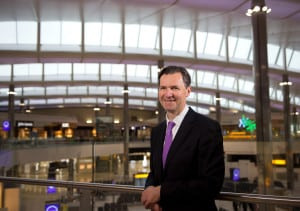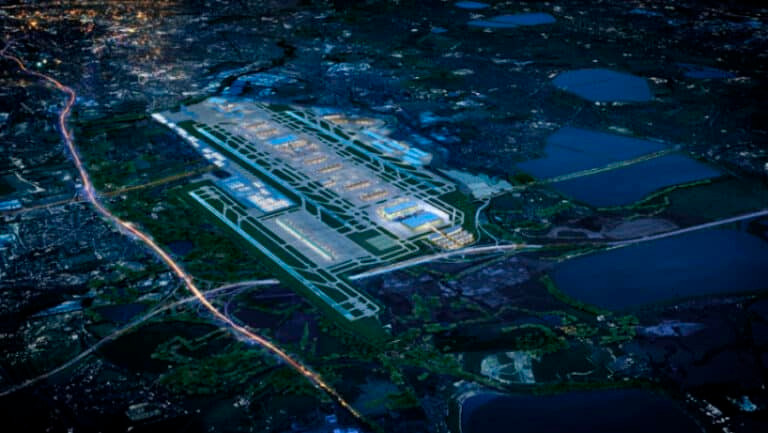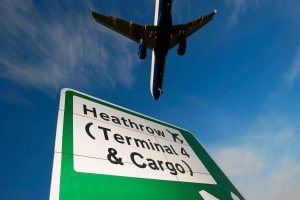Heathrow Airport chief executive officer John Holland-Kaye said yesterday he feels it has finally come to a point where the government will make a decision to back Heathrow expansion, while also questioning whether Gatwick can meet the needs of British exporters.
He was speaking at the Westminster Energy, Environment and Transport Forum, which held a seminar at the Royal Society entitled – What now for airport expansion in the South East?
A decision on airport expansion is set to be made this autumn after it was put on hold due to a change of UK PM and European Union Referendum. The issue has been lingering since the Airports Commission endorsed Heathrow for expansion last summer, as it said there were more economic benefits of a third runway than a second runway at Gatwick Airport.
Holland-Kaye said the Brexit vote has made a decision more imperative than ever: “Leaving the EU means that it’s more essential than ever that we create trading links to the growing markets of the world – and that we control our own trade routes.
“Only Heathrow expansion can do this. And it’s an urgent task, if we are to have a strong and fair post-Brexit economy.”
Holland-Kaye said an expanded Heathrow will boost UK exports and improve trade links while helping the country make the most of Brexit: “The same planes that carry Britain’s exporters around the world also carry their exports – in fact almost 30 per cent of all non-EU exports go by air from Heathrow.
“Anything high value, with a short supply chain or a short shelf life goes by air from Heathrow. Heathrow provides Britain’s trade routes to growth markets, and helps us to be an independent and strong trading nation. But we have been at capacity for a decade.
“And that lack of capacity increasingly means that British exporters have to go through a foreign hubs to get to world markets, which adds time and cost – putting them at a competitive disadvantage and handing control of Britain’s supply routes to our competitors.
“If we want Britain to remain strong, then we need to sustain and grow our own links to those burgeoning economies.”

Holland-Kaye cited Mexico as an example saying it is a key emerging market and has 120 million consumers, “hungry” for British goods and expertise and should be developing stronger trade links.
He took a swipe at Gatwick as said you can get a seasonal flight to Cancun “the party capital of Mexico” but at Heathrow you get a daily service, all year round, to Mexico City – the business capital, where the economy is growing at almost five per cent a year.
Holland-Kaye said these links are the “lifeblood of a stronger economy” and said the economic benefits of an expanded Heathrow far outweigh that of rival Gatwick.
He said the UK cannot ignore the Brexit decision on 23 June and the whole country needs the ability to trade with the world, adding: “Britain needs to rebalance the economy towards exports, and Heathrow can help make that happen, delivering a fairer Brexit.
“You may wonder how here in London, we can talk about the benefits of Heathrow expansion to towns and cities hundreds of miles away. But exports show how Heathrow’s global connectivity is crucial to the prosperity of our regions and nations.
“You may be surprised to learn that the biggest export through Heathrow by volume is high quality salmon, worth £280 million to the Scottish economy. Regular connections from Heathrow mean fresh salmon can get from the farm in Scotland to the seafood market in Tokyo within 24 hours.
“Think how much more could we export, with more flights from Scottish cities to Heathrow, connecting to 40 new long haul destinations?”
He also singled out the North East, which he said is was one of the UK’s most successful exporting regions, and said Heathrow’s six flights a day there connects the region to every corner of the globe.
Holland-Kaye said: “Miller Manufacturing, based in Cramlington, export their specialist construction equipment via Heathrow to India and China, and they are now expanding into Australia and the Middle East.”
He questioned whether Gatwick could be the airport to get British exporters, from every region, to those emerging markets: “History says not. In spite of spare capacity, they serve fewer emerging markets, serve fewer UK cities and carry fewer exports than they did six years ago.
“In spite of being at capacity, Heathrow serves more emerging markets, serves more UK cities and carries more exports.
“In fact, we carry more cargo in a bank holiday weekend than Gatwick does in a year.”
But ultimately in his view it comes down to one main factor: “So the real question we face is quite simple. Which will Britain choose to be – a hub or a spoke?” – paying reference between the contrasting choice of the UK government of the two rivals.
The UK awaits the landmark decision and the green light from the government to build its first runway to be built in the South East for 50 years, and Holland-Kaye for one is sure which one will benefit the UK’s economy, export market and trade links in an uncertain post-Brexit world.




